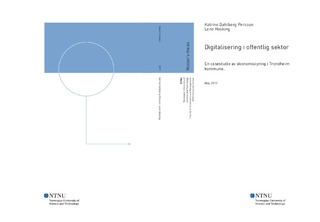| dc.description.abstract | Dagens samfunn er i stadig utvikling gjennom økt fokus på digitalisering. Teknologiske nyvinninger og digitaliseringsprosesser bidrar til utvikling, samt endring i byråkratiske organisasjonsstrukturer. Følgelig er også økonomistyring i forandring. Moderne faglitteratur viser til mye forskning på både digitalisering og økonomistyring. I arbeidet med denne masteroppgaven ble det likevel identifisert et kunnskapsgap i dagens faglitteratur. Dagsaktuell forskning viser til manglende koblinger av hvordan implementering av digitale verktøy endrer økonomistyring i offentlig sektor. Formålet med denne masteroppgaven er å etablere innsikt, og forståelse av hvordan digitalisering bidrar til endringer i økonomistyring i norske kommuner. Med dette som bakgrunn ble følgende problemstilling formulert:
“Hvordan endrer økonomistyringen seg i en kommune som følge av digitalisering?”
For å besvare denne problemstillingen ble en kvalitativ casestudie gjennomført. Vår casestudie omfatter ni dybdeintervju, underbygd med tilhørende dokumentstudier. Casestudien tok for seg økonomistyringen i Trondheim kommune, hvor intervjuobjektene bestod av seks økonomirådgivere, samt tre sentrale ledere i kommunen.
Casestudien viser til økt fokus på digitalisering og satsing på systemutvikling i kommunens økonomistyring. Casestudien indikerer også at press fra omgivelsene er en avgjørende driver for digitalisering i kommunen. Bruk av digitale verktøy har eksempelvis ført til endringer i retning av en mer transparent og desentralisert økonomistyring. Informasjonsflyten har blitt mer effektivisert, og ytterligere tilgjengeliggjort ved at flere inkluderes i beslutningsprosesser. Det observeres også at Trondheim kommune har igangsatt flere sentrale tiltak som tilsier at kommunens økonomistyringstilnærming er i endring. Denne utviklingen har likhetstrekk med den teknologifokuserte ideologien Digital Era Governance. Studien argumenterer for at implementeringen av digitale verktøy i økonomistyringen bidrar til en hybridisering av controllerrollen. Satsingen på nye digitale verktøy argumenterer for økonomisk kompetanse i kombinasjon med teknisk forståelse og kommunikative ferdigheter som sentrale egenskaper for controlleren. Disse egenskapene er avgjørende for at controlleren skal kunne håndtere tradisjonelle oppgaver innen økonomistyring, men også mer moderne oppgaver. Eksempelvis innen databehandling og analyseoppgaver. I sum demonstrerer vår studie at Trondheim kommune er på vei mot en digital transformasjon. | |
| dc.description.abstract | Modern societies experience constant developing change through an increased focus on digitalization. New technology and digitalization processes are changing bureaucratic organizational structures. Consequently, management accounting and control are in transition as well. In modern literature both digitalization along with management accounting and control are widely discussed. However, through the work with this master thesis we acknowledge a gap in the reviewed literature on the subject matter. The purpose of this study is to establish insight and understanding on how digitalization is changing management accounting and control in a Norwegian municipality. This is examined by the following research question:
"How does management accounting and control change in a municipality as a result of digitalization?"
To answer this research question, a qualitative case study of management accounting and control in Trondheim Municipality was carried out. A total of nine in-depth interviews with six controllers and three leaders were conducted, supplemented with substantiating studies of topical documents made available by the municipality.
The case study showed an increased focus on digitalization and system development in management accounting and control within the municipality. Firstly, findings indicate that external pressure is an important impetus for digitalization development. Secondly, the use of digital tools contributes to more transparent and decentralized management accounting and control in municipalities. Lastly, the flow of information also becomes more efficient and accessible through the implementation of digital tools. As a result, more people are included in decision-making processes. Supplementary observations in the case study, showed that Trondheim Municipality has initiated several development projects, which indicates that the municipality’s approach towards management accounting and control is experiencing change. This evolving approach demonstrates similarities with the technology focused ideology Digital Era Governance. Findings also argue that the implementation of digital tools leads to a hybridization of the controller’s role. Due to the escalating focus on the utilization of new digital tools; both knowledge of technology, communications and co-operation, as well as competence in economics are compulsory skillsets required for current controllers. These skills are essential when handling both traditional and more modern tasks, such as data processing and in analysis. In summary, this thesis shows how Trondheim Municipality is moving towards a digital transformation. | |
